Any successful business relies on sales growth. Understanding sales performance is crucial in a competitive market where consumer preferences and behaviors change. Analysis of precise performance data is one of the best ways to do this. Actionable indicators help firms make decisions, adjust strategy, and grow sales. This article discusses how detailed performance measurements improve sales results.
Understanding the Customer Journey
Understanding the customer journey is crucial to using performance indicators for sales growth. From first contact to final purchase, every customer engagement with a business produces significant data. Performance metrics let firms track these encounters thoroughly.
Conversion rates, customer acquisition expenses, and customer lifetime value show how well a company attracts and retains consumers. Incorporating these insights can lead to more personalized marketing efforts and improved customer experiences, including the increasingly popular live shopping experience, which blends entertainment with real-time purchasing opportunities.

Identifying Sales Trends and Patterns
Detailed performance indicators help detect sales tendencies. By studying data over time, businesses can identify seasonal trends, peak sales, and customer buying patterns. Inventory management, marketing, and sales forecasting require this data.
If measurements show a sales spike around holidays or seasons, companies might stock up on popular products and conduct targeted promotions to optimize income. By understanding these patterns, businesses can predict market demands and alter their strategy.
Enhancing Sales Strategies
Performance metrics strengthen sales strategy refinement. Average order value, cart abandonment rate, and sales funnel conversion rates reveal development opportunities. High cart abandonment rates may suggest checkout problems or additional expenses that prevent people from buying.
By addressing these pain points, businesses may improve the buying experience and convert more prospects. Additionally, client feedback and satisfaction indicators can help organizations customize their sales strategies to customer demands and preferences.
Measuring the Effectiveness of Marketing Campaigns
Marketing initiatives boost sales, but reliable measurement is key. Businesses may assess the effectiveness of digital advertising, email marketing, and social media promotions using detailed performance indicators.
Click-through rates, conversion rates, and ROI show a campaign’s success or need for improvement. Companies may optimize their marketing strategy in real time by analyzing these KPIs to ensure they reach the intended audience and achieve their goals.

Informing Product Development and Innovation
Product development and innovation are essential for sales growth in a changing market. Detailed performance measures inform these methods. Customer feedback, sales statistics, and market trends reveal product performance and consumer preferences. Metrics can show the most popular product aspects, items under-performing, and market gaps.
Businesses can use this data to improve, launch, and discontinue products. Companies may remain ahead of the competition and boost sales by matching product development to client needs.
Facilitating Data-Driven Decision-Making
Thorough performance measures benefit data-driven decision-making. Today, intuition and experience are not enough to succeed in business. Data must be precise and complete to inform business initiatives.
Performance indicators inform business decisions in marketing, sales, customer service, and product development. These measurements help firms manage risks, capture opportunities, and expand sales sustainably.
CONCLUSION
Specific performance measures are essential for sales-focused firms. Companies may boost sales by understanding the customer journey, recognizing sales trends, improving sales strategies, analyzing marketing effectiveness, guiding product development, and supporting data-driven decision-making.
Analyzing and acting on these data will be crucial to staying competitive and successful as the industry evolves.





